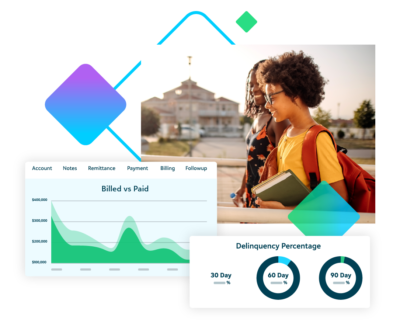How to Improve On-Time Tuition Payments

Private and independent schools rely on tuition to fund operations. In its 2023–2024 Trendbook, the National Association of Independent Schools (NAIS) estimates that net tuition revenue—tuition minus financial aid—makes up 79% of independent schools’ income. Without the steady cash flow of tuition, schools might not meet budget, payroll may need to be sourced from other funds, and the ability to maintain academic and extracurricular programs may suffer. That’s why it is critical to have a tuition collection strategy that encourages on-time payments and reduces tuition delinquency.
Being proactive in preventing late payments is essential to the financial health and success of independent educational institutions.
The best practice guidelines below empower business officers to stop chasing late payments and keep their school’s cash flow positive. It all boils down to three key tenants: choice, flexibility, and engagement.
Choice
Offer families a choice in when and how they pay.
Most tuition-based schools no longer collect full annual tuition before classes start. Instead, they offer families payment plans. We recommend schools provide three choices: pay in full, pay each semester, or make monthly payments—either throughout the school year or on a 12-month basis, depending on which the school prefers. These options allow private schools to expand student recruitment and help reduce tuition delinquency by increasing payers’ ownership of their tuition cycle.
How a school takes payments also significantly impacts timeliness. The most effective schools make the process easy and convenient for families by accepting payments via checks or money order, secure mobile-friendly online portal, automatic bank withdrawals (ACH), online banking services, cash, debit cards, and credit cards.
Flexibility
Create goodwill by working with families when issues arise.
Tuition is a significant expense for families. According to the Education Data Initiative, the 2023–24 average U.S. private school annual tuition is $12,594. The private elementary school average is $11,660 per year, and the private high school average is $16,144 per year.
Life happens, and the goodwill created by renegotiating tuition payment plans for extenuating circumstances can benefit the school in the long run. However, before a business officer offers flexibility, it’s essential to have rules that define the terms of tuition payment and processing and have school leadership fully support those policies.
The tuition cycle starts with the school’s contract, which should clearly outline policies, expectations, and consequences that families acknowledge during enrollment. Having that contract roll from the school’s admissions software into its tuition management system helps eliminate chaos and confusion. Providing tuition payment terms on the contract and in each invoice lets the family know precisely when, how, and how much to pay. To keep families on schedule, ensure school invoicing occurs at regular intervals for which they can plan.
When a situation calls for compassion, the best approach is to negotiate a partial payment because some money in the short term is better than none. The business officer can then discuss a new payment plan for the remaining balance. In some circumstances—such as a job loss or death of a care provider—the school may consider a mid-year financial aid award to ease the burden on that family.
Engagement
Address delinquencies promptly and professionally.
If a family’s payment is late, address the situation with direct and immediate engagement.
For schools that manage their own billing processes, this means giving rigorous attention to payment due dates and quickly contacting the family to investigate the reason. School debt recovery often requires follow-up to impress upon families the importance of timely payment. Families are busier than ever, and the missed payment may be an honest mistake, or they may believe that the school doesn’t mind if they pay slowly.
Using a third party to handle the follow-up saves the school time internally and conveys the seriousness of the late payment. Many families prefer to work with a third party over the potential embarrassment of direct conversations with the school.
The Blackbaud Tuition Management™ Difference
Blackbaud Tuition Management is a fully integrated billing solution for processing tuition and fee payments. Initially designed by school administrators who grew tired of staying on top of families prone to missing payments, our system successfully reduces delinquencies for schools by:
1. Offering choices. Blackbaud Tuition Management provides schools with customizable tuition payment plans and the ability to include fees for things like aftercare and field trips on each electronic invoice. By clearly outlining the expenses, families have fewer billing questions and are more apt to pay on time.
Schools can offer families any of the following payment options through Blackbaud’s secure, mobile-friendly online portal:
- Credit or debit cards
- Automatic debit (ACH)
- Online banking service
- E-Check
Schools may also choose to offer these offline options:
- Check or money order in person, by mail, or by phone
- Credit or debit card at the school
- Cash payments (accepted at over 15,000 off-campus retail locations)
- Cash payments at the school
2. Understanding the need for flexibility. We provide support seven days a week with convenient hours to counsel payers and take payments. By working closely with the school to understand its policies, we can help families find the best way to honor payments when hardships occur.
3. Engaging quickly. Our optional follow-up service begins immediately with an email and a text message when a payment is missed. These communications are handled by trained professionals with the utmost compassion and respect. The service includes structured follow-ups to engage families until their overdue payment is made.
4. Providing late fees for a reason. Late fees are standard in all industries because they encourage on-time payments. Blackbaud doesn’t charge a traditional late fee. Instead, when schools use our follow-up service, we charge late payers a follow-up service fee for the work involved.
While our goal is to engage parents and avoid burdening them with extra fees, we have found that our late fee structure reduces delinquencies and even alters the behavior of chronic late payers. For many families, advance communication regarding late fees in the school’s enrollment contract, parent handbook, and other timely reminders is enough to deter late payments.
Blackbaud Tuition Management allows schools to consolidate billing and payments into a subsidiary ledger for the business office while giving families a variety of ways to pay tuition and fees in a secure, compliant environment. Our mobile-friendly family portal has strong encryption mechanisms and uses multi-factor authentication. Funds are placed in FDIC-insured custodial accounts. The school is empowered to set up automated alerts, take payments securely, and include optional “shopping cart” items like yearbooks, prom tickets, uniforms, and more. If the school uses Blackbaud’s Total School Solution, tuition and fees flow seamlessly to the general ledger, and families use the same login to make payments as they do to view grades, schedules, and assignments.
Case Study
St. Paul’s Episcopal Day School
In a third-party study conducted by Forrester Research, they found that St. Paul’s Episcopal Day School decreased delinquencies by 50% and reduced the number of checks received by 75% with Blackbaud Tuition Management. These improvements increased cash flow by $42,276 per year and, along with other newly introduced efficiencies, accounted for $71,608 in annual savings.
![]() 50% reduction in delinquencies
50% reduction in delinquencies
![]() 75% reduction in checks processed
75% reduction in checks processed
 $42,276 in increased cash flow
$42,276 in increased cash flow
![]() $71,608 in annual cost savings
$71,608 in annual cost savings
In short, the one-year cost savings from Blackbaud Tuition Management alone covered the implementation fees and the first-year software licensing fees for Blackbaud’s Total School Solution adopted at St. Paul’s Episcopal Day School.
“I have been very happy with [Blackbaud Tuition Management]. The ability to take payments on the phone or online has greatly decreased the number of payments processed here at the school. Because that revenue just rolls directly into our checking account, it’s just a matter of reconciling the bank deposit, which is easy.”
— Christina Cutcliffe, Special Projects Manager, St. Paul’s Episcopal Day School
Keep Your School Running and Families Happy
Find out how Blackbaud Tuition Management™ fits your school.




